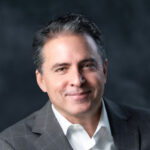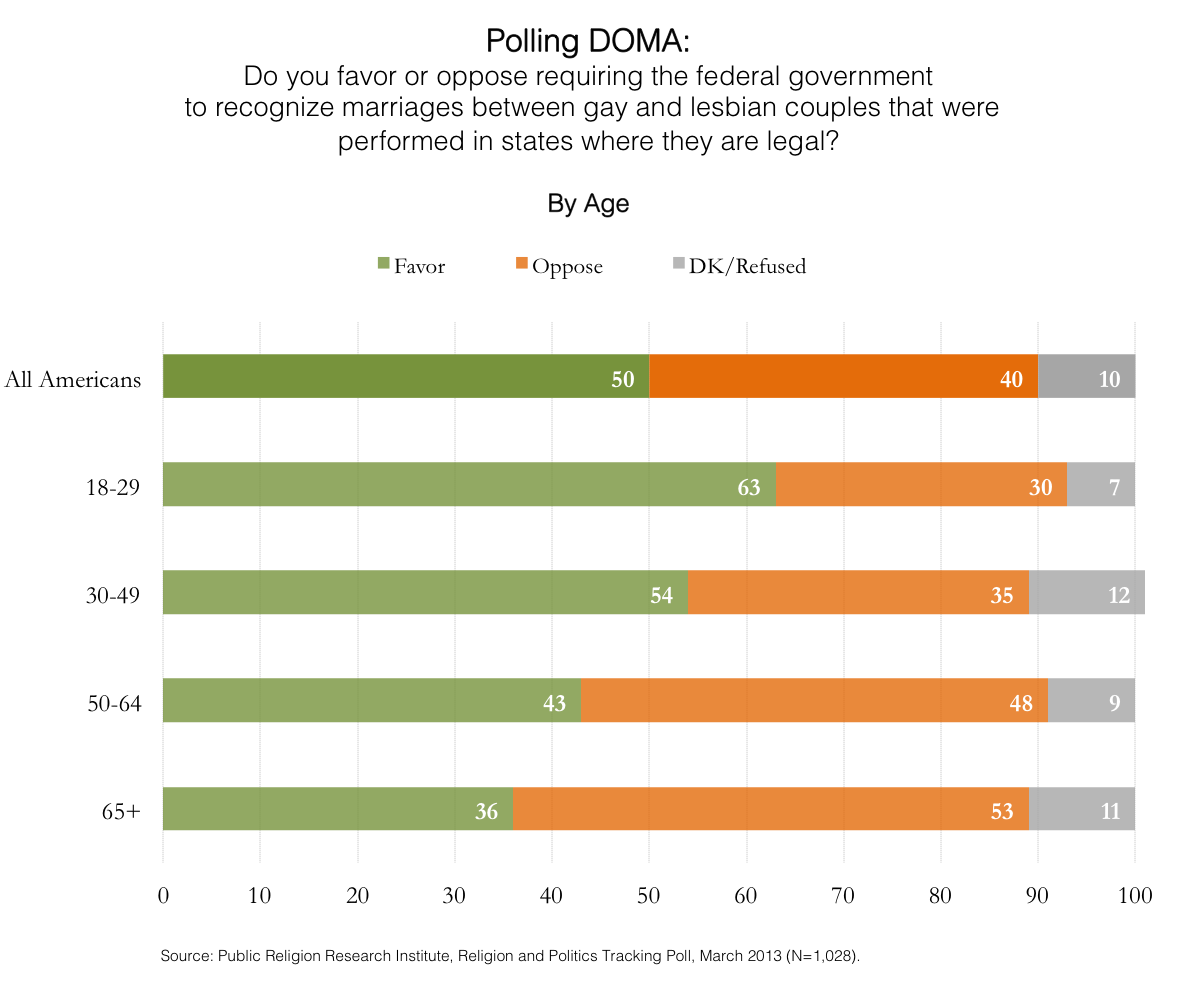Half of Americans Favor Federal Recognition of Same-sex Marriage
I. The Defense of Marriage Act and Federalism
Half (50%) of Americans favor requiring the federal government to recognize marriages between gay and lesbian couples that were performed in states where same-sex marriage is legal, while 4-in-10 (40%) are opposed. Strong divisions persist by political affiliation, religion, and generation.
Nearly two-thirds of Democrats (65%) and half (50%) of independents favor requiring the federal government to recognize marriages between gay and lesbian couples that were performed in states where same-sex marriage is legal. Less than one-third of Republicans (32%) favor federal recognition of same-sex marriages, while more than 6-in-10 (61%) are opposed.
Majorities of religiously unaffiliated Americans (71%), white mainline Protestants (54%), and Catholics (52%) favor requiring the federal government to recognize marriages between gay and lesbian couples that were performed in states where same-sex marriage is legal. Meanwhile, majorities of white evangelical Protestants (70%) oppose this requirement. Minority Christians are divided (41% favor, 44% opposed).
More than 6-in-10 (63%) Millennials (age 18-29) favor requiring the federal government to recognize marriages between gay and lesbian couples that were performed in states where same-sex marriage is legal, compared to 36% of seniors (age 65 and older). A majority (53%) of seniors oppose this requirement.
Nearly half (48%) of Americans say that same-sex marriage should be left up to the states, while 43% believe it should be decided at the national level. Americans who favor allowing gay and lesbian couples to marry are much more likely than those who are opposed to say the issue should be decided at the federal level (55% vs. 32%).
II. Changing Views and Certainty About Same-sex Marriage
Half (50%) of Americans currently support allowing gay and lesbian couples to marry legally, while nearly 4-in-10 (39%) are opposed. The patterns of support by political affiliation, religious affiliation, and generation for same-sex marriage are nearly identical to support for requiring the federal government to recognize marriages between gay and lesbian couples that were performed in states where same-sex marriage is legal. For a fuller demographic analysis on same-sex marriage, see our fact sheet here.
Nearly 7-in-10 (68%) Americans report that their views on the legality of same-sex have not changed in the last five years. Americans are, however, more than twice as likely to say their views have become more supportive (20%) over the past five years rather than more opposed (8%).
Most (55%) Americans say they are absolutely certain their position on same-sex marriage is the right one. Roughly 1-in-4 (24%) say they are fairly certain, and 14% say they are not too certain or not at all certain.
Generally speaking, Americans who oppose same-sex marriage are more likely to report that they are certain about their position than Americans who are in favor of it (48% vs. 32%). However, Americans who strongly oppose or strongly favor same-sex marriage are equally likely to say they are absolutely certain that their view is right (79% vs. 82%).
White evangelical Protestants (65%) are more likely than other religious groups, including religiously unaffiliated Americans (57%), minority Christians (51%), Catholics (49%), and white mainline Protestants (48%), to say they are absolutely certain that their views on the issue of same-sex marriage are right.
Seniors also report being less certain of their views than younger Americans. Less than half (49%) of seniors report that they are absolutely certain their position on the issue is the right one, compared to nearly 6-in-10 (59%) Millennials.
III. Churches and Clergy: Ordination of Gay and Lesbian People and Women
Half (50%) of Americans agree that gay and lesbian people should be eligible for ordination as clergy with no special requirements, while less than 4-in-10 (38%) disagree.
Majorities of religiously unaffiliated Americans (69%) and Catholics (54%) favor allowing gay and lesbian people to be ordained as clergy, compared to half (50%) of white mainline Protestants, 4-in-10 (41%) minority Christians, and less than 1-in-4 (24%) white evangelical Protestants. Nearly 7-in-10 (69%) white evangelical Protestants say they oppose such a policy.
There is significantly more public support for ordaining women as clergy than for ordaining gay and lesbian people. More than 7-in-10 (71%) Americans agree that women should be eligible for ordination as clergy with no special requirements, compared to 20% who disagree.
Majorities of every major religious group favor ordaining women, including 73% of white mainline Protestants, 71% of minority Christians, 70% of Catholics, and 63% of white evangelical Protestants. More than three-quarters (76%) of religiously unaffiliated Americans also support ordaining women as clergy.
IV. The Morality-Acceptance Gap on Gay and Lesbian Relationships
Two-thirds (67%) of Americans agree that gay and lesbian relationships should be accepted by society, while roughly 1-in-4 (26%) disagree. At the same time, Americans are nearly evenly divided over whether or not sex between two adults of the same gender is a sin (44% say it is, 46% say it is not).
There are significant differences in views about morality by religious affiliation. About three-quarters (74%) of white evangelical Protestants and more than 6-in-10 (63%) minority Christians say that sex between two adults of the same gender is a sin, compared to less than 4-in-10 white mainline Protestants (38%) and Catholics (39%). Less than 1-in-5 (18%) religiously unaffiliated Americans believe sex between two adults of the same gender is a sin, while nearly 8-in-10 (77%) say it is not.
Notably, a significant minority (44%) of Americans who believe that sex between two adults of the same gender is a sin nevertheless agree that gay and lesbian relationships should be accepted by society.
V. Sexual Orientation
A majority (53%) of Americans say that a gay or lesbian person’s sexual orientation cannot be changed. Roughly one-third (32%) say it can be changed, and 15% say they have no opinion.
Close to half (46%) of white evangelical Protestants and minority Christians (47%) believe a gay or lesbian person’s sexual orientation can be changed. By contrast, majorities of white mainline Protestants (57%), Catholics (65%), and the religiously unaffiliated (65%) say a gay or lesbian person’s sexual orientation cannot be changed.
Disagreements over the nature of sexual orientation also divide Americans by political affiliation. While 63% of Democrats believe that a gay or lesbian person’s sexual orientation cannot be changed, only 37% of Republicans agree; 45% of Republicans believe that sexual orientation can be changed.
Opinions on the nature of sexual orientation are associated with views on same-sex marriage. Among those who say a gay or lesbian person’s sexual orientation cannot be changed, 68% support allowing gay and lesbian couples to marry. By contrast, among those who say sexual orientation can be changed, 33% support allowing gay and lesbian couples to marry.
Recommended citation:
Jones, Robert P., Daniel Cox, and Juhem Navarro-Rivera. “Half of Americans Favor Federal Recognition of Same-sex Marriage.” PRRI. 2013. http://www.prri.org/research/march-2013-religion-politics-tracking-survey/.





